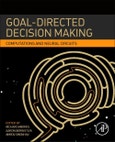Goal-Directed Decision Making: Computations and Neural Circuits examines the role of goal-directed choice. It begins with an examination of the computations performed by associated circuits, but then moves on to in-depth examinations on how goal-directed learning interacts with other forms of choice and response selection. This is the only book that embraces the multidisciplinary nature of this area of decision-making, integrating our knowledge of goal-directed decision-making from basic, computational, clinical, and ethology research into a single resource that is invaluable for neuroscientists, psychologists and computer scientists alike.
The book presents discussions on the broader field of decision-making and how it has expanded to incorporate ideas related to flexible behaviors, such as cognitive control, economic choice, and Bayesian inference, as well as the influences that motivation, context and cues have on behavior and decision-making.
Please Note: This is an On Demand product, delivery may take up to 11 working days after payment has been received.
Table of Contents
1. Actions and Habits: Psychological Issues in Dual Process Theory
Computations 2. Instrumental Divergence and Goal-Directed Choice 3. Temporal Dynamics of Goal-Directed Decision Making 4. Episodic Memory Influences on Goal-Directed Decision Making 5. Structure Learning 6. Simulation and Evaluation in Deliberative Decision Making 7. Competition and Cooperation between Multiple RL Systems
Neuroscience 8. Cortical Determinants of Goal-Directed Action 9. Distinct Functional Microcircuits in the Nucleus Accumbens Underlying Goal-Directed Decision Making 10. Striatal Cholinergic Interneurons and Goal-Directed Learning 11. Dopaminergic Prediction Errors and the Acquisition of Model-Based Behavior 12. The Role of the Orbitofrontal Cortex in Reinforcement Learning and Goal-Directed Decision Making
Applications 13. The Development of Goal-Directed Decision Making 14. Social Behavior 15. Goal-Directed Deficits in Psychosis 16. Goal-Directed Action in Disorders of Compulsivity 17. Drug Addiction: Augmented Habit Learning or Failure of Goal-Directed Control? 18. Alpha-Go
Open Questions 19. Realigning Models of Habitual and Goal-Directed Decision Making 20. Motivations of Action and Reward








